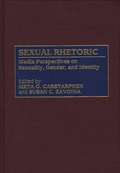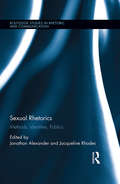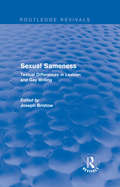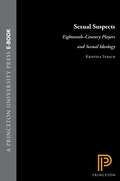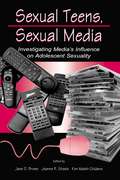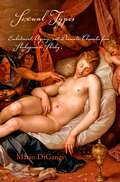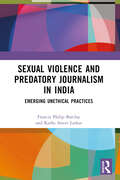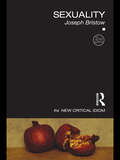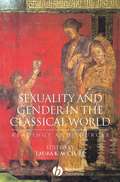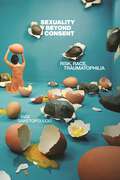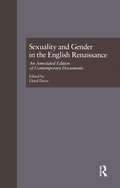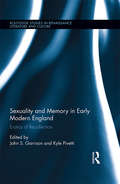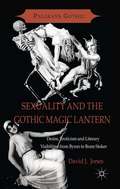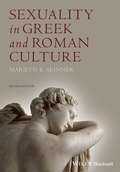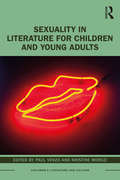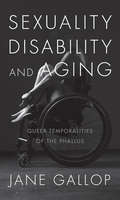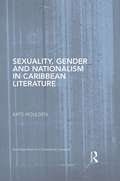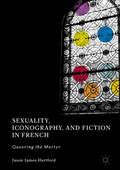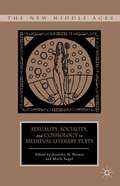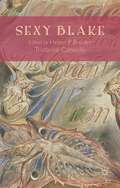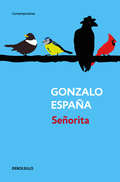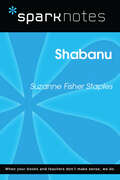- Table View
- List View
Sexual Rhetoric: Media Perspectives on Sexuality, Gender, and Identity (Contributions to the Study of Mass Media and Communications #57)
by Meta Carstarphen Susan ZavoinaThis work explores, through case studies and critical analyses, how media depictions affect the social construction of gender, sexuality, and identity. Through a combination of historical and contemporary topics, scholars examine the stereotypical portrayal of women and men and the contexts within which these stereotypes are illustrated.
Sexual Rhetorics: Methods, Identities, Publics (Routledge Studies in Rhetoric and Communication)
by Jonathan Alexander Jacqueline RhodesSexual rhetoric is the self-conscious and critical engagement with discourses of sexuality that exposes both their naturalization and their queering, their torquing to create different or counter-discourses, giving voice and agency to multiple and complex sexual experiences. This volume explores the intersection of rhetoric and sexuality through the varieties of methods available in the fields of rhetoric and writing studies, including case studies, theoretical questioning, ethnographies, or close (and distant) readings of "texts" that help us think through the rhetorical force of sexuality and the sexual force of rhetoric.
Sexual Sameness: Textual Differences in Lesbian and Gay Writing (Routledge Revivals)
by Joseph BristowFirst published in 1992, Sexual Sameness examines the differing textual strategies male and female writers have developed to celebrate homosexuality. Examining such writers as E.M. Forster, James Baldwin, Sylvia Townsend Warner and Audre Lourde, this wide-ranging book demonstrates how literature has been one of the few cultural spaces in which sexual outsiders have been able to explore forbidden desires. From the humiliating trials of Oscar Wilde to the appalling stigmatisation of people living with AIDS, Sexual Sameness reveals the persistent homophobia that has until recently almost completely inhibited our understanding of lesbian and gay writing. In opening up homosexual literature to informed and objective methods of reading, Sexual Sameness will be of interest to a large lesbian and gay readership, as well as to students of gender studies, literary studies and the social sciences.
Sexual Suspects: Eighteenth-Century Players and Sexual Ideology
by Kristina StraubHow the suspect sexuality of actors and actresses shaped early modern debates about gender and sexual identityFrom the Restoration through the eighteenth century, the sexuality of actors and actresses was written about in ways that stirred the public imagination. Actors were frequently suspected of heterosexual promiscuity or labeled effeminate or even as &“sodomites,&” and actresses were often viewed as prostitutes or sexually ambivalent victims of their profession. Kristina Straub argues that this depiction of players greatly shaped public debates about what made women feminine and men masculine. Considering a wide range of literature by or about players—pamphlets, newspaper reports, theatrical histories, and biographies as well as the public correspondence between Alexander Pope and the famed actor Colley Cibber—she examines the formation of gender roles and sexual identities during a period crucial to modern thinking on these issues.Drawing from feminist-materialist and gay and lesbian theories and historiographies, Sexual Suspects analyzes the complex development of spectacle and spectatorship as gendered concepts. She reveals how national, racial, and class differences contributed to the subjection of players as professional spectacles and how images of race, class, and gender combined to create divisions between &“normal&” and &“deviant&” sexuality.
Sexual Teens, Sexual Media: Investigating Media's Influence on Adolescent Sexuality (Routledge Communication Series)
by Kim Walsh-Childers Jane D. Brown Jeanne R. SteeleThis collection explores the sexual content of U.S. mass media and its influence in the lives of adolescents. Contributors address the topic of sexuality broadly, including evidence not only about physical sex acts, but also about the role the media play in the development of gender roles, standards of beauty, courtship, and relationship norms. Chapters included here present new perspectives on what teens are paying attention to in the media, and offer insight into how teens are understanding and applying what the media present about sex and sexuality. Employing various methodological approaches, the studies also represent a diversity of adolescent audiences and deal with a wide variety of media content, ranging from teens' favorite TV programs to magazines, movies, music, and teen girls' Web pages. Taken as a whole, this volume highlights the significant roles the media play in adolescents' sexual lives. Sexual Teens, Sexual Media contributes important evidence to the ongoing debate over media effects, making it essential reading for scholars and students in media studies, as well as social and developmental psychology.
Sexual Types: Embodiment, Agency, and Dramatic Character from Shakespeare to Shirley
by Mario DiGangiSexual types on the early modern stage are at once strange and familiar, associated with a range of "unnatural" or "monstrous" sexual and gender practices, yet familiar because readily identifiable as types: recognizable figures of literary imagination and social fantasy. From the many found in early modern culture, Mario DiGangi here focuses on six types that reveal in particularly compelling ways, both individually and collectively, how sexual transgressions were understood to intersect with social, gender, economic, and political transgressions.Building on feminist and queer scholarship, Sexual Types demonstrates how the sodomite, the tribade (a woman-loving woman), the narcissistic courtier, the citizen wife, the bawd, and the court favorite function as sites of ideological contradiction in dramatic texts. On the one hand, these sexual types are vilified and disciplined for violating social and sexual norms; on the other hand, they can take the form of dynamic, resourceful characters who expose the limitations of the categories that attempt to define and contain them. In bringing sexuality and character studies into conjunction with one another, Sexual Types provides illuminating new readings of familiar plays, such as Shakespeare's A Midsummer Night's Dream and The Winter's Tale, and of lesser-known plays by Fletcher, Middleton, and Shirley.
Sexual Violence and Predatory Journalism in India: Emerging Unethical Practices
by Francis Philip Barclay Kaifia Ancer LaskarSexual Violence and Predatory Journalism in India examines unethical editorial practices in the reporting of sexual crimes against women in India, introducing the term Predatory Journalism. This book conceptualises and analyses predatory practices that commodify sexual crimes against women, examining how it is facilitated and motivated by online spaces and social media channels and how it can often result in further harm to victims and their families. It argues for editorial intervention, more regulation, policy measures and legal frameworks that will help build a sensitive and ethical media landscape and rebuild public trust. Key issues examined include sexism, sensationalism, invasion of privacy, victim blaming, media trials, media manipulation of information, armchair reporting, explicit sexual imagery, the usage of unreliable sources and a lack of responsibility and accountability. Providing a comprehensive analysis of the issue and offering a framework for ethical practice, Sexual Violence and Predatory Journalism in India will be essential reading for scholars and students of media and cultural studies, journalism and sociology interested in the intersection of media and crime in India and its associated ethical challenges.
Sexual Violence in Western Thought and Writing
by Victor J. VitanzaThis book examines how rape and sexual violencehave become canonized""in the form of rape""stories. Through close readings of a wide array of texts, Vitanza offers an exposition of the ways in which our reading, writing, and thinking practices are complicit in the production of rape culture andlays the groundwork for a newapproach to reading, writing, and thinking. "
Sexuality (The New Critical Idiom)
by Joseph BristowTheories of sexuality and desire are commonly used in literary and cultural studies. In this illuminating study Joseph Bristow introduces readers to the fundamental critical debates surrounding the topic. This fully updated second edition includes: a historical account of sexuality from the Victorians to the present discussions of the most influential theorists including Freud, Lacan, Bataille, Baudrillard, Cixous, Deleuze, Irigaray and Kristeva a new and extended discussion of queer and transgender theory, race, ethnicity and desire a new preface summarising changes in the field since the first edition a new glossary, annotated further reading section and bibliography. Considering all of the major movements in the field, this new edition is the ideal guide for students of literary and cultural studies.
Sexuality And Gender In The Classical World: Readings And Sources (Interpreting Ancient History)
by Laura McClureThis volume provides essays that represent a range of perspectives on women, gender and sexuality in the ancient world, tracing the debates from the late 1960s to the late 1990s.
Sexuality Beyond Consent: Risk, Race, Traumatophilia (Sexual Cultures)
by Avgi SaketopoulouRadical alternatives to consent and traumaArguing that we have become culturally obsessed with healing trauma, Sexuality Beyond Consent calls attention to what traumatized subjects do with their pain. The erotics of racism offers a paradigmatic example of how what is proximal to violation may become an unexpected site of flourishing. Central to the transformational possibilities of trauma is a queer form of consent, limit consent, that is not about guarding the self but about risking experience. Saketopoulou thereby shows why sexualities beyond consent may be worth risking-and how risk can solicit the future.Moving between clinical and cultural case studies, Saketopoulou takes up theatrical and cinematic works such as Slave Play and The Night Porter, to chart how trauma and sexuality join forces to surge through the aesthetic domain. Putting the psychoanalytic theory of Jean Laplanche in conversation with queer of color critique, performance studies, and philosophy, Sexuality Beyond Consent proposes that enduring the strange in ourselves, not to master trauma but to rub up against it, can open us up to encounters with opacity. The book concludes by theorizing currents of sadism that, when pursued ethically, can animate unique forms of interpersonal and social care.
Sexuality and Being in the Poststructuralist Universe of Clarice Lispector
by Earl E. FitzDriven by an unfulfilled desire for the unattainable, ultimately indefinable Other, the protagonists of the novels and stories of acclaimed Brazilian writer Clarice Lispector exemplify and humanize many of the issues central to poststructuralist thought, from the nature of language, truth, and meaning to the unstable relationships between language, being, and reality. In this book, Earl Fitz demonstrates that, in turn, poststructuralism offers important and revealing insights into all aspects of Lispector's writing, including her style, sense of structure, characters, themes, and socio-political conscience. Fitz draws on Lispector's entire oeuvre-novels, stories, crônicas, and children's literature-to argue that her writing consistently reflects the basic tenets of poststructuralist theory. He shows how Lispector's characters struggle over and humanize poststructuralist dilemmas and how their essential sense of being is deeply dependent on a shifting, and typically transgressive, sense of desire and sexuality.
Sexuality and Gender in the English Renaissance: An Annotated Edition of Contemporary Documents (Garland Studies in the Renaissance #Vol. 10)
by Lloyd DavisFirst published in 1998. This anthology coomprises a diverse range of historical treatises and tracts that discuss and debate gender and sexual relations in early modern England. Combining complete texts and extracts-many hitherto unavailable in modern editions-the collection focuses on prevailing conceptions of sexuality and gender in major areas and institutions of Tudor and Stuart society. A broad selection of religious sermons, moral handbooks, household manuals, midwifery and legal textbooks, ballads and chapbooks has been chosen.
Sexuality and Memory in Early Modern England: Literature and the Erotics of Recollection (Routledge Studies in Renaissance Literature and Culture)
by John S. Garrison Kyle PivettiThis volume brings together two vibrant areas of Renaissance studies today: memory and sexuality. The contributors show that not only Shakespeare but also a broad range of his contemporaries were deeply interested in how memory and sexuality interact. Are erotic experiences heightened or deflated by the presence of memory? Can a sexual act be commemorative? Can an act of memory be eroticized? How do forms of romantic desire underwrite forms of memory? To answer such questions, these authors examine drama, poetry, and prose from both major authors and lesser-studied figures in the canon of Renaissance literature. Alongside a number of insightful readings, they show that sonnets enact a sexual exchange of memory; that epics of nationhood cannot help but eroticize their subjects; that the act of sex in Renaissance tragedy too often depends upon violence of the past. Memory, these scholars propose, re-shapes the concerns of queer and sexuality studies - including the unhistorical, the experience of desire, and the limits of the body. So too does the erotic revise the dominant trends of memory studies, from the rhetoric of the medieval memory arts to the formation of collective pasts.
Sexuality and the Gothic Magic Lantern
by David J. JonesThis fascinating study explores the multifarious erotic themes associated with the magic lantern shows, which proved the dominant visual medium of the West for 350 years, and analyses how the shows influenced the portrayals of sexuality in major works of Gothic fiction.
Sexuality in Greek and Roman Culture
by Marilyn B. SkinnerThis agenda-setting text has been fully revised in its second edition, with coverage extended into the Christian era. It remains the most comprehensive and engaging introduction to the sexual cultures of ancient Greece and Rome.Covers a wide range of subjects, including Greek pederasty and the symposium, ancient prostitution, representations of women in Greece and Rome, and the public regulation of sexual behaviorExpanded coverage extends to the advent of Christianity, includes added illustrations, and offers student-friendly pedagogical featuresText boxes supply intriguing information about tangential topicsGives a thorough overview of current literature while encouraging further reading and discussionConveys the complexity of ancient attitudes towards sexuality and gender and the modern debates they have engendered
Sexuality in Literature for Children and Young Adults (Children's Literature and Culture)
by Paul VenzoExpanding outward from previous scholarship on gender, queerness, and heteronormativity in children’s literature, this book offers fresh insights into representations of sex and sexuality in texts for young people. In this collection, new and established scholars examine how fiction and non-fiction writing, picture books, film and television and graphic novels position young people in relation to ideologies around sexuality, sexual identity, and embodiment. This book questions how such texts communicate a sense of what is possible, impossible, taboo, or encouraged in terms of being sexual and sexual being. Each chapter is motivated by a set of important questions: How are representations of sex and sexuality depicted in texts for young people? How do these representations affect and shape the kinds of sexualities offered as models to young readers? And to what extent is sexual diversity acknowledged and represented across different narrative and aesthetic modes? This work brings together a diverse range of conceptual and theoretical approaches that are framed by the idea of sexual becoming: the manner in which texts for young people invite their readers to assess and potentially adopt ways of thinking and being in terms of sex and sexuality.
Sexuality in Literature for Children and Young Adults (Children's Literature and Culture)
by Paul VenzoExpanding outward from previous scholarship on gender, queerness, and heteronormativity in children’s literature, this book offers fresh insights into representations of sex and sexuality in texts for young people. In this collection, new and established scholars examine how fiction and non-fiction writing, picture books, film and television and graphic novels position young people in relation to ideologies around sexuality, sexual identity, and embodiment. This book questions how such texts communicate a sense of what is possible, impossible, taboo, or encouraged in terms of being sexual and sexual being. Each chapter is motivated by a set of important questions: How are representations of sex and sexuality depicted in texts for young people? How do these representations affect and shape the kinds of sexualities offered as models to young readers? And to what extent is sexual diversity acknowledged and represented across different narrative and aesthetic modes? This work brings together a diverse range of conceptual and theoretical approaches that are framed by the idea of sexual becoming: the manner in which texts for young people invite their readers to assess and potentially adopt ways of thinking and being in terms of sex and sexuality.
Sexuality, Disability, and Aging: Queer Temporalities of the Phallus
by Jane GallopDrawing on her own experiences with late-onset disability and its impact on her sex life, along with her expertise as a cultural critic, Jane Gallop explores how disability and aging work to undermine one's sense of self. She challenges common conceptions that equate the decline of bodily potential and ability with a permanent and irretrievable loss, arguing that such a loss can be both temporary and positively transformative. With Sexuality, Disability, and Aging, Gallop explores and celebrates how sexuality transforms and becomes more queer in the lives of the no longer young and the no longer able while at the same time demonstrating how disability can generate new forms of sexual fantasy and erotic possibility.
Sexuality, Gender and Nationalism in Caribbean Literature (Routledge Research in Postcolonial Literatures)
by Kate HouldenThis book focuses on sex and sexuality in post-war novels from the Anglophone Caribbean. Countering the critical orthodoxy that literature from this period dealt with sex only tangentially, implicitly transmitting sexist or homophobic messages, the author instead highlights the range and diversity in its representations of sexual life. She draws on gender and sexuality studies, postcolonial theory and cultural history to provide new readings of seminal figures like Samuel Selvon and George Lamming whilst also calling attention to the work of innovative, lesser-studied authors such as Andrew Salkey, Oscar Dathorne and Rosa Guy. Offering a coherent and expansive overview of how post-war Caribbean novelists have treated the persistently controversial topic of sex, this book addresses one of the blind spots in Caribbean literary criticism. It mines a range of little-studied archival materials and texts to argue that fiction of the post-war era exhibits both continuities with the sexual emphases of earlier writing and connections to later trends. The author also presents nationalist ideology as central to the literature of this era. It is in the fictional rendering of sexuality that the contradictions of the nationalist project are most apparent; sex both exceeds and threatens the imagined unity on which the political vision depends.
Sexuality, Iconography, and Fiction in French: Queering the Martyr
by Jason James HartfordThis book explores the modern cultural history of the queer martyr in France and Belgium. By analyzing how popular writers in French responded to Catholic doctrine and the tradition of St. Sebastian in art, Queering the Martyr shows how religious and secular symbols overlapped to produce not one, but two martyr-types. These are the queer type, typified first by Gustave Flaubert, which is a philosophical foil, and the gay type, popularized by Jean Genet but created by the Belgian Georges Eekhoud, which is a political and pornographic device. Grounded in feminist queer theory and working from a post-psychoanalytical point of view, the argument explores the potential and limits of these two figures, noting especially the persistence of misogyny in religious culture.
Sexuality, Sociality, and Cosmology in Medieval Literary Texts
by Jennifer N. Brown Marla SegolThis edited volume contains nine articles exploring medieval sexuality and its relation to cosmological and social ordering. All of our authors analyze literary texts, both religious and secular, using a variety of critical methodologies. These include discourse theory, psychoanalytic criticism, queer theory, masculinity studies, and new historicist methodologies, among others. However, we all begin with the notion that medieval sexuality is distinct from our own conceptions of it, and that the one of the most important factors in considering its difference is its conceptualization in terms of social and cosmological ordering. Medieval people ordered their communities differently than contemporary people do, and they conceptualized their relationship to them based on different cosmological models that the ones we currently use. As a result, they thought of sexuality differently as well. This volume explores the relation between sexuality, social taxonomies, and cosmology in medieval religious and secular literature, as well as the various contemporary methodologies available for conceptualizing this. Its theoretical importance lies in this dual focus, which will render the collection useful to a wide audience of students and teachers of medieval literature, religion and history, as well as to those interested in the history of sexuality generally. "
Sexy Blake
by Tristanne Connolly Helen P. BruderThis book lays bare numerous sexy Blakes, arguing for both chastity and pornography, violence and domination as well as desire and redemption, and also journeying in the realms of conceptual sex and conceptual art. Fierce tussles over the body in, and the body of, the poet-artist's work celebrate Blakean attractions and repulsions.
Señorita
by Gonzalo España"La violencia colombiana de los cincuenta llega a la literaturadigerida, domesticada y definitivamente transformada en materianovelesca. Esta proeza de alquimia se logra al filtrar los hechos através de la memoria de un niño, cuya presencia actúacomo purificador, como aire que alivia, como posibilidad salvadorade perdón. Gracias al tino narrativo y poético de Señorita,podemos ahora sonreír ante los temores que sentimos de niños.Podemos mirar hacia atrás con afecto".Laura Restrepo En plena época de la Violencia, Laurentino es enviadopor sus padres a pasar las vacaciones en Portugal, unpequeño pueblo en tierra caliente donde viven sustíos. Laurentino juega a las canicas, persigue aves consu cauchera, va a la caza de un legendario pato, peroentre sus ocios de niño se cuela el misterioso y a vecesaterrador mundo de los adultos: los recelos, las trampas,los odios y las riñas por los colores y por las ideas#y Señorita, el ?ero y delicado guerrillero liberal quede?ende a los lugareños y que por sus maneras y subravura es el héroe que a todos embruja y representa.
Shabanu (SparkNotes Literature Guide Series)
by SparkNotesShabanu (SparkNotes Literature Guide) by Suzanne Fisher Staples Making the reading experience fun! Created by Harvard students for students everywhere, SparkNotes is a new breed of study guide: smarter, better, faster. Geared to what today's students need to know, SparkNotes provides: *Chapter-by-chapter analysis *Explanations of key themes, motifs, and symbols *A review quiz and essay topicsLively and accessible, these guides are perfect for late-night studying and writing papers
